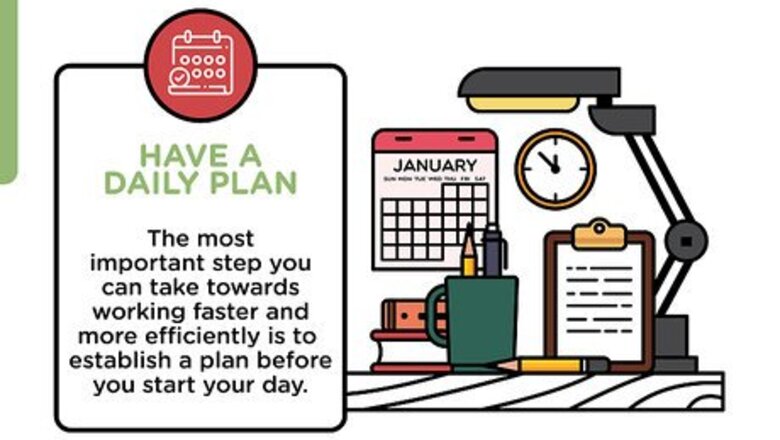
views
Planning Your Workflow
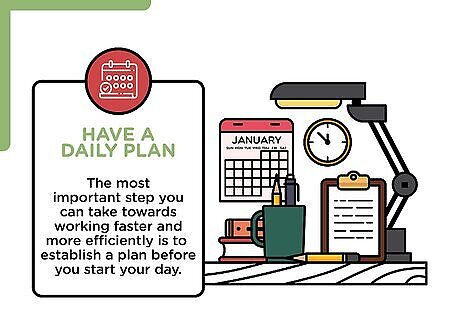
Make a list of everything you need to do each day. The most important step you can take toward working faster and more efficiently is to establish a plan before you start your day. Write down everything you need to accomplish for each day so you don't waste time trying to figure out what to do next. Write your daily plan down on a notepad, digital planner, or a calendar. Writing things down rather than committing them to memory will help you to remember and actually accomplish your tasks. Writing down all you plan to accomplish in a day can also help you avoid over-booking yourself and taking on more than you can handle in the time allotted. It’s good to be ambitious, but it’s also important to have a realistic daily plan that you can accomplish.
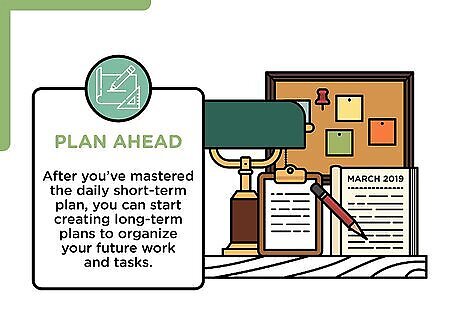
Create a calendar for deadlines. After you’ve mastered the daily short-term plan, you can start creating long-term plans to organize your future work and tasks. Knowing what you need to accomplish ahead of time—whether it's a big term paper at the end of the semester or an international conference trip—can help you prepare and meet your deadlines. Write down each task or project as soon as you can so you're sure to be prepared for it and accomplish it on time. Note any big deadlines or due dates and pencil in some reminders a week or so before the actual deadline. This will help you work more efficiently and get your big tasks done in easier increments. This type of advanced planning will also help you schedule leisure actives, breaks, and vacations. If you know when things are going to be due, you can more easily plan around them and make sure you have enough time to get things done as well as thoroughly enjoy your break time.
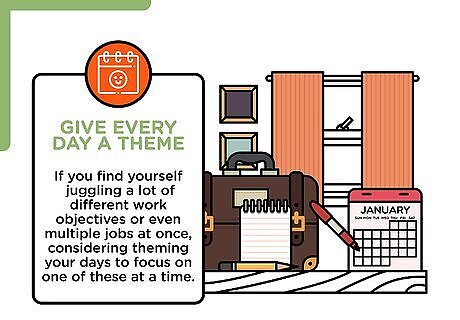
Give every day a theme if you have a variety of tasks to do. If you find yourself juggling a lot of different work objectives or even multiple jobs at once, focus on a single work category per day. If you’re a student, consider setting aside specific days for specific subjects: Mondays can be reserved for doing all of your science reading for the week, for example, while Tuesdays can be dedicated to math. In an office setting, allocate specific days for specific tasks: Mondays can be just for administrative tasks, for example, while Tuesdays can be focused on creative projects.
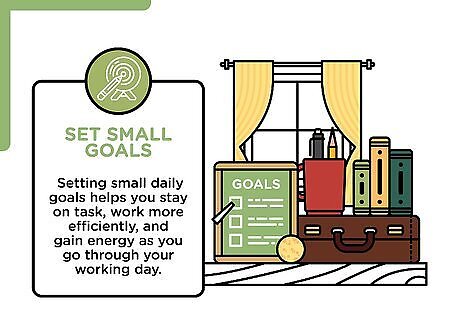
Set small, achievable goals. Setting small daily goals helps you stay on task, work more efficiently, and gain energy as you go through your working day. If you have long-term objectives or big projects, break them down into smaller goals that you can make progress on and tackle in a series of small steps or stages. This will help you feel like you're getting work done, which will encourage you to keep going. Getting little tasks out of the way, like grocery shopping or running errands, can help you focus on larger tasks that need to be accomplished later in the day.
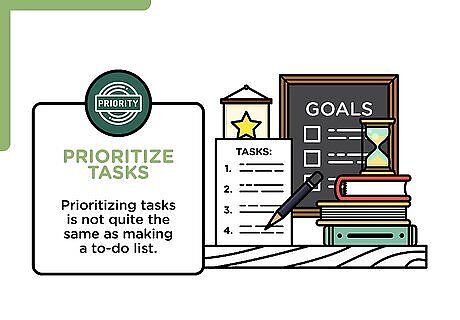
Prioritize harder tasks. Getting the most important or difficult tasks out of the way first can give you a sense of accomplishment. It also makes you more productive so you can breeze through the easier tasks later in the day. On the other hand, if you get the menial tasks out of the way first, you might be reluctant to tackle a big project in the second half of the day.
Time Management
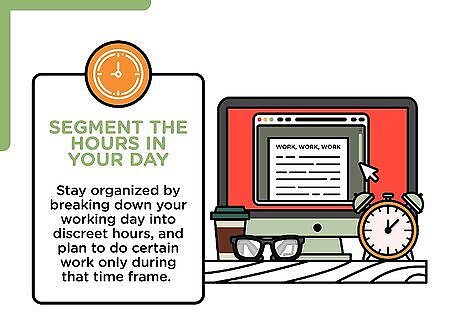
Break up your workday into chunks. Plan to do certain tasks during each chunk so your day is organized.For example, the first hour of your day can be dedicated to answering emails and phone calls. Set a series of alarms to cue you to move on to other work and stay on task during the day.
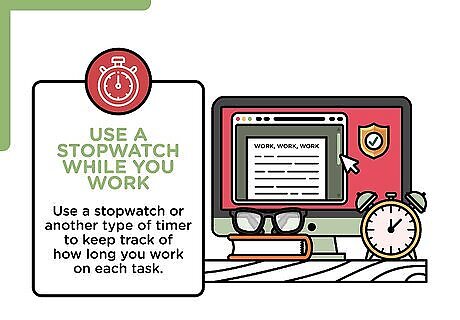
Set a time limit for each task. In business, there’s a concept known as “Parkinson’s Law,” which states that “work expands to fill the time allotted for it.” In other words, if you leave the amount of time needed to complete a task open-ended, you will almost always take more time to complete it than if you set strict time limits. Use a stopwatch or another type of timer to keep track of how long you work on each task. Set goals for yourself and turn this into a game; you’ll work far more rapidly if you’re attempting to beat the clock.
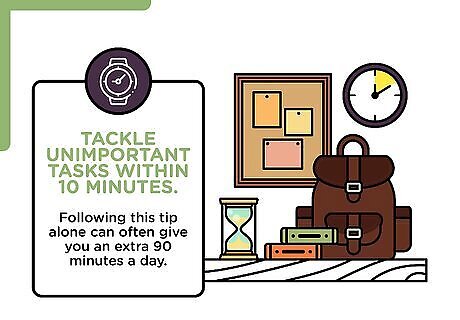
Tackle unimportant tasks within 10 minutes. Following this tip alone can often give you an extra 90 minutes a day. You'll be surprised how much time is wasted on unimportant tasks like writing emails! Working this way can help you develop a work “flow,” something that behavioral psychologists have described as a feeling of accomplishment, productivity, and happiness.
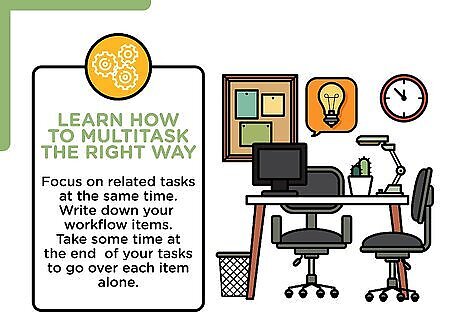
Multitask the right way. Multitasking can be a double-edged sword: it can be a helpful strategy for getting lots of things done in a short amount of time, or it can spread your time and attention too thin, leading to poor quality work.To reap the benefits while avoiding the pitfalls of multitasking, follow these strategies: Focus on related tasks at the same time. Reduce the amount of mental energy used when switching between different tasks by bundling your multitasking activities together. For example, respond to all of your mail messages at the same time (email, voicemail, and snail-mail). Write down your workflow items. Writing down all the stuff you want to juggle will help you to not get distracted or sidetracked with all the multiple things going. Take some time at the end of your tasks to go over each item alone. This narrowing of focus can help with catching any errors and making sure you've done all you wanted while working on it in a multitasking atmosphere.
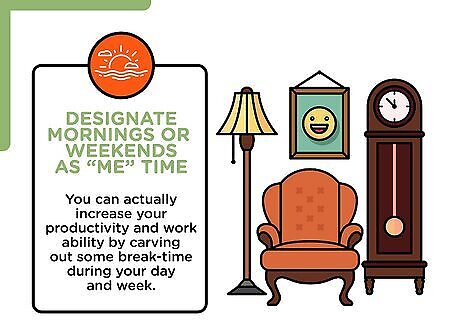
Set aside personal time to disconnect from work. It might sound counterintuitive, but you can actually increase your productivity by carving out some break time during your day and week.Rather than worrying about work or what you need to accomplish later, focus fully on whatever you choose to do during your "me" time. Spending the first few hours in the morning on something you care about—whether it's playing with your kids, taking the dog for a walk, or doing yoga—can help clear your mind and put you in a better mood for the rest of the day, which will help you stay focused and work faster. Set up separate personal and work or school email accounts and limit how often you check your work or school account over the weekend. Try to be mindful and take some time to really switch off from your work worries, especially on the weekends, so that when you do get back to the grind on Monday you can be refreshed and ready to work faster and more efficiently.
Staying on Task
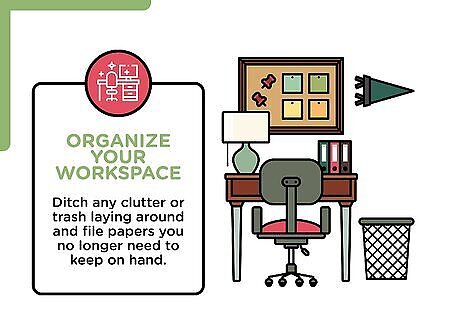
Organize your workspace. Ditch any clutter or trash laying around and file papers you no longer need to keep on hand. Prepare your desk by laying out all your study or work materials so you can just jump right in. If your space feels calming instead of hectic, you're likely to be more efficient.
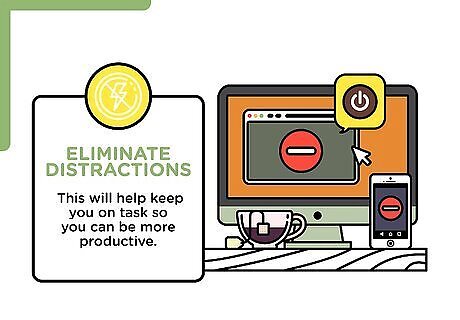
Eliminate distractions. Put your phone on silent or store it in your bag or backpack so you're not tempted to check it. Turn off the TV or radio if they tend to steal your attention away from your work, too. Let friends, family, and even your colleagues know when you're busy and aren't able to chat. This will help keep you on task so you can be more productive.
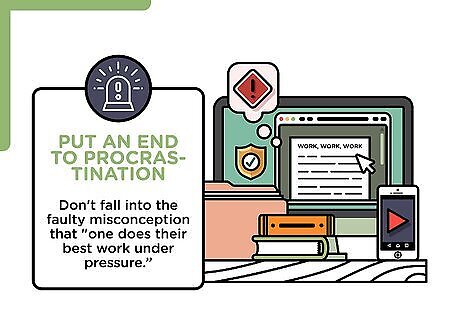
Put an end to procrastination. Many of us procrastinate or put things off (especially things we don't like) which can negatively impact our productivity as well as overall work quality. Avoid doing this and just jump right in! Don't fall into the faulty misconception that "one does their best work under pressure." Psychological studies have shown this to largely be untrue! Procrastinators who wait until the last minute often get less done and produce work with more errors. Plan a celebration or treat for yourself when you complete your task on time or even early. If you have something fun to look forward to, you'll give yourself extra motivation to get your work done.










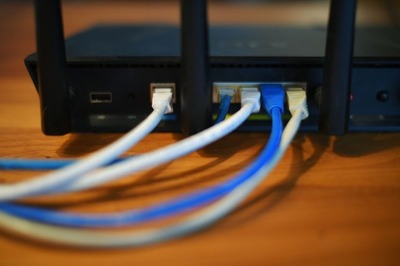






Comments
0 comment